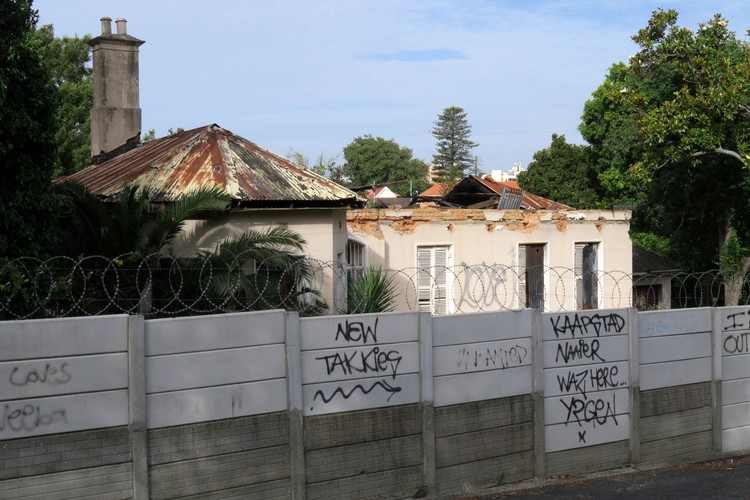
17 November 2023
One of the stripped houses owned by the Department of Public Works and Infrastructure at Waterloo Green, Wynberg. Five people were seen entering the unlocked gate to the property shortly before this photo was taken. Photos: Steve Kretzmann
The Department of Public Works and Infrastructure (DPWI) was lambasted by Members of Parliament during a portfolio committee meeting on Wednesday over the department’s failure to maintain prime property in Wynberg, Cape Town.
The property on Waterloo Green in Wynberg is 21,000m2 (about the size of two rugby fields) and has six buildings. Two houses on the property have been stripped of plumbing and electrical cabling and local residents say it is a den for drug users.
One double-storey house protected by security guards appears to still be mostly intact, while two other houses appear to have tenants but are in a state of disrepair.
The houses were previously used by SAPS for accommodation but were handed back to the DPWI in 2016. The sixth building, a warehouse, is still used by SAPS as a garage.
The Portfolio Committee on Public Works and Infrastructure was presented with a petition by neighbouring residents wanting the two derelict houses to be demolished and the DPWI to answer for it. The two houses that have been stripped, and the one protected by a security company, have heritage status as they were built more than 150 years ago. The two-hectare property, bordered by three primary schools and a high school, and is close to the upmarket Chelsea Village and Maynardville Park, is potentially worth tens of millions of rands.
DPWI regional manager Penny Penxa told the committee there have been several proposals for the use of the properties. The Department of Defence had requested to use the property to house doctors who work at the nearby military hospital. With a magistrate’s court nearby, the Department of Justice wanted to use one of the houses as an office. Schools proposed using some of the land for parking.
Penxa said when SAPS handed the buildings back in 2016, they had already been “invaded” and “deterioration had taken place”. She said a security company was appointed in 2021 to “try and contain the illegal occupation”.
She apologised for the department having let the buildings deteriorate and said they were hiring lawyers to obtain an eviction order against the illegal occupants.
A heritage house on Waterloo Green belonging to the public works department.
Safety concerns highlighted
Ward Councillor Emile Langenhoven (DA), presenting on behalf of Wynberg residents, said problems such as illegal dumping on the property started before 2016. There was later evidence that the houses were illegally occupied. In November 2017, the thatch roof at one of the houses caught fire. The building was also registered as a problem building with the City of Cape Town in 2018 due to safety concerns.
Langenhoven said Wynberg residents tried to find solutions to prevent illegal occupation of the properties. “There were many requests to the DPWI to solve this problem,” he said.
“There were several raids and arrests made at the property but there seems to be no solution. There was an assurance in place that demolition was going to take place in April 2023. Months went by without anything happening,” said Langenhoven.
Sam Wilcox-Diedericks, a resident who addressed the committee, said they have been watching the property decay for the past decade.
Much of the property in Waterloo Green, Wynberg, is open park but fenced off. The buildings in the background are used by SAPS as a garage.
Assets not maintained
The MPs were not impressed by the department’s response. Wayne Thring (ACDP) said this was a consequence of what the portfolio committee had been talking about “for many years”.
“We have seen this around the country,” said Thring, who also criticised the department for providing no clear timelines for its proposed actions.
Additionally, the department did not provide a written presentation to the committee as required, which Isaac Seitlholo (DA) said was unacceptable. “We will find ourselves in this position over and over again where properties are being allowed to deteriorate,” said Seitlholo.
DPWI deputy minister Bernice Swarts promised to return to the committee with a written submission within seven days. “We have a policy that will allow us to demolish properties, but it cannot override what is deemed as heritage sites,” said Swarts. She said the written submission would explain what the current policy allowed them to do.
“We are going to work on a solution to allow the (Wynberg) residents to be comfortable. This challenge has been going back years,” she added.
Committee chair Nolitha Ntobongwana (ANC) said the committee would compile a report to be discussed by all parties in Parliament.
Housing opportunities lost
Nick Budlender, researcher at housing advocacy group Ndifuna Ukwazi, told GroundUp the DPWI, like other government institutions, continued to waste and mismanage potentially transformative public land across South Africa.
“As if leaving public land vacant and underutilised for decades is not enough, the department freely admits that it has no real grasp on which properties it owns and what condition they are in,” said Budlender.
“This not only reflects a significant administrative failure, but more seriously it also reflects an inability and unwillingness to use public land to build cities that are more just, more efficient and more sustainable. We have to demand better.”